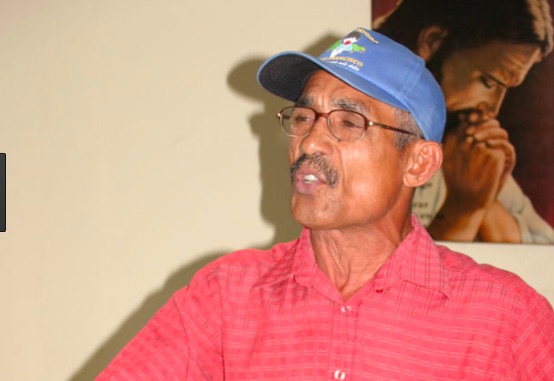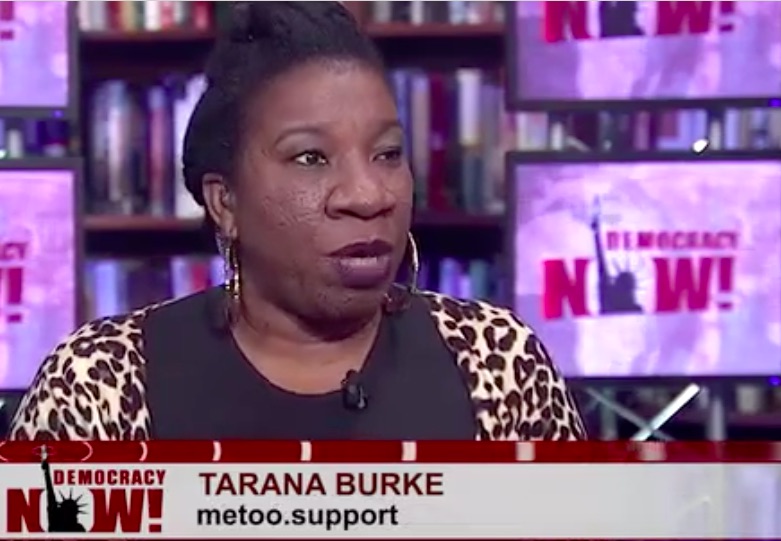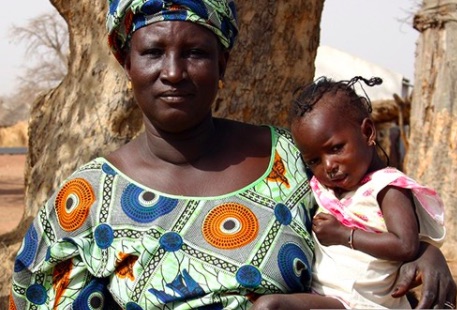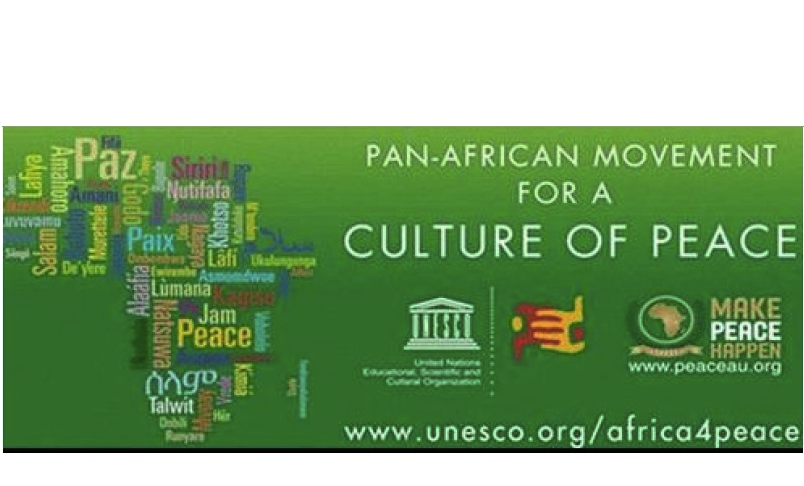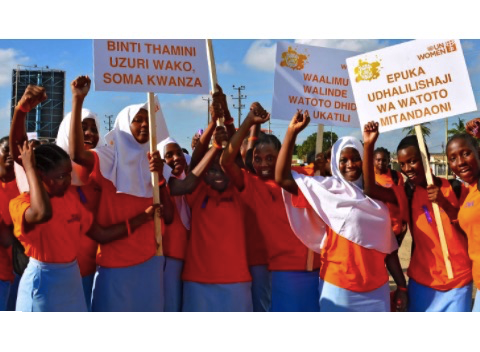. . WOMEN’S EQUALITY . .
An article in El Universo
Campaigns, emerging actions, laws and other projects are being implemented in various countries to combat femicide.
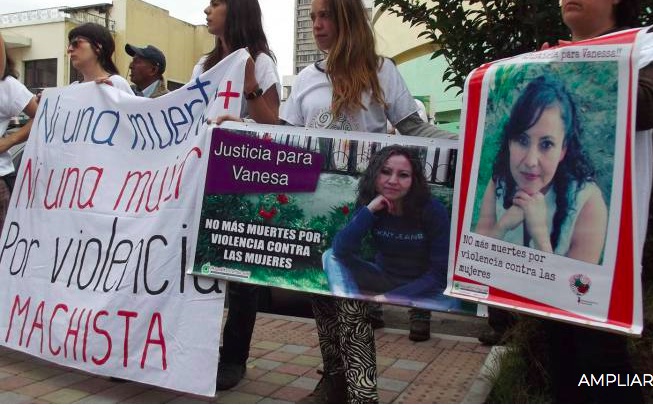
Three weeks ago a protest was held in Quito to reject violence against women. Photo: Roberto Rueda
Chile
In 2010, the Femicide Law was enacted. The regulations modified the Criminal Code and the Law of Domestic Violence, condemning femicide, increasing the penalties applicable to this crime and modifying the rules on parricide (killing a relative).
Chile currently has 103 centers nationwide where first care is given to all women who need help, as well as guidance and information in relation to the different manifestations of violence against women. In addition, shelters have been established to protect women victims of violence, incorporating housing, food and services.
Argentina
On November 14, 2012, the Chamber of Deputies of Argentina approved a law that provides for certain amendments to the Criminal Code. This reform incorporated femicide as an aggravated crime of simple homicide.
In the country a plan of prevention, assistance and eradication of violence has been developed, because a woman is killed every 37 hours.
Uruguay
This year, the Chamber of Senators of Uruguay unanimously approved a bill that modifies articles 311 and 312 of the Criminal Code, in which femicide was introduced as a particularly aggravated form of homicide because of a woman’s gender, and which will carry penalties of up to 30 years in prison.
Among its programs, a 2016-2019 Action Plan is being carried out for a life free of gender violence, with a generational view.
Paraguay
The Senate approved in 2016 with amendments the draft Law on Comprehensive Protection against Violence against Women. Among the reforms is the typification of the crime of femicide with prison terms of up to 30 years. In Paraguay the term femicide is used and one in every ten murders are being considered as femicide.
Paraguay has a “Protocol of Inter-institutional Action in the face of violent death, attempted death and high-risk violence against women (“Promuvi-Mujer”). In addition, there is a Ministry of Women which is the governing body of the system for attention to violence against women and for support of those affected by feminicide.
There is also the Witness Program of the Public Ministry, for cases in which the risk assessment indicates assistance.
Bolivia
The crime of feminicide is punishable by a 30-year prison sentence, without the right to a pardon, after the Comprehensive Law to Guarantee Women a Life Free of Violence was approved in 2013.
The campaign ‘For a life without violence’, was recently launched, aiming to promote respect for women’s rights.
(article continued in right column)
(click here for the original Spanish version of this article.)
Protecting women and girls against violence, Is progress being made?
(article continued from left column)
Brazil
With the Femicide Law, approved on March 9, the murder of women as a result of domestic violence or discrimination based on sex, becomes a heinous crime and is included as such in the Brazilian Penal Code. In the country, every two minutes five women suffer physical violence.
Since August 2014, UN Women, the Secretariat of Policies for Women of Brazil and the Embassy of Austria have been coordinating with law, justice and police operators to adapt the Model Latin American Protocol for the Investigation of Violent Deaths in Brazil for reasons of Gender. With that, they provide guidelines and instruments to support the work of the people responsible for the investigation and criminal prosecution of the violent death of women due to gender.
Peru
Since 2016, Article 108 has recognized femicide. In 2015 Law 30364 was passed to prevent, eradicate and punish all forms of violence produced in the public or private sphere against women because of their condition.
Peru has carried out the campaign “Voices for change” an ingenious initiative that initially counted on the participation of representatives of the staff of the Ministry of Women.
Recently, participants of the Miss Peru 2018 beauty pageant took advantage of the catwalks and spotlights to denounce gender violence and femicides in their country.
Colombia
In 2015, President Juan Manuel Santos sanctioned the law that defines femicide as an autonomous crime, guaranteeing investigation and criminalization of violence against women for reasons of gender. The sentences established in the norm vary between 250 and 500 months of imprisonment.
Currently, the campaign ‘Conmuévete y Muévete’ is being used to raise awareness against femicides and murders of social leaders. In addition, it is required that violence in society not be considersd as normal
Venezuela
Femicide was included as a crime for the first time, in the Organic Law for the Right of Women to a Life Free of Violence. On November 25, 2014, the reform was formalized in which this act was classified as a crime under the name of femicide.
In October of this year, the group of women and sexual diversity, Pan y Rosas, launched the campaign for an “Emergency Law against Violence against Women”, where they ensure that prevention and assistance to women who have been violated, in order to prevent crimes and murders against women. In addition, they argue that the financing of this law must be guaranteed through large taxes on large companies
El Salvador
In 2016, specialized courts were created to prosecute crimes of violence against women. One of the most important achievements was the recognition of femicide as a crime, punishable by 20 to 50 years in prison.
A campaign has been launched against machismo with the slogan “Put a goal to machismo”, promoted by international organizations. The campaign, which will last until December, fosters a culture of peace and denunciation so that women can assert their human rights.
Mexico
Since 2007 there is a General Law on Women’s Access to a Life Free of Violence, but only 20 of the 32 Mexican states apply the protocols. The resolution indicates that homicides of women on grounds of gender are called femicides. These crimes will be investigated according to specialized protocols with a gender perspective. Femicide has been prohibited since 2011 with a prison sentence of 20 to 50 years.
In September, the video “Seguras” was released, a collective effort by Mexican women, concerned about the situation of gender violence.
